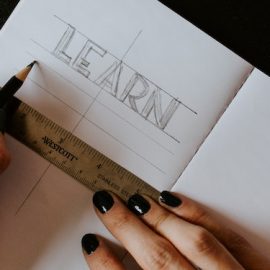

This article is an excerpt from the Shortform book guide to "Be Your Future Self Now" by Benjamin Hardy. Shortform has the world's best summaries and analyses of books you should be reading.
Like this article? Sign up for a free trial here.
Why are empowering beliefs important to adopt? What are the disempowering beliefs you should avoid?
Empowering beliefs help you become your higher self because they give you a positive outlook on life. Benjamin Hardy’s book Be Your Future Self Now reassures you that you can gain autonomy over your life if you avoid negativity and discouraging beliefs.
Empower yourself and learn how to take control of your destiny below.
Have an Empowering View of Life and Fate
Hardy argues that many people fail to become their higher selves because they have a disempowering view of life and fate. Specifically, they believe they lack autonomy over who they are and who they can become because of three factors:
- Their past
- Their current circumstances
- An inability to control their fate
(Shortform note: Hardy argues that having a negative view of life and fate will prevent you from achieving success in life. Similarly, Rhonda Byrne argues in The Secret that your mindset directly impacts your reality and what you’re able to accomplish. This is because, according to The Law of Attraction, your thoughts have a certain energy frequency that attracts similar energy frequencies. A negative mindset attracts negativity back to you while a positive mindset attracts positivity. So if you truly believe that you can and will accomplish your desires (hallmarks of a positive mindset), the universe will make this your reality.)
Let’s explore the roots of these three disempowering beliefs and the empowering beliefs to adopt instead.
Belief #1: Don’t Let Your Past Dictate Your Future
Hardy explains that many people falsely believe their traumas and past shape who they are and what their future holds. For example, if you got poor grades in art class as a child, you may believe that you lack the potential to become a graphic designer. However, Hardy argues that regardless of what happens in your life, you always have the power to choose what happens next.
If you look at negative past experiences and believe they’ve limited your future, this will become your reality. However, if you tell yourself that your negative past experiences have helped you grow—for example, by teaching you an important lesson, reminding you what’s important in life, or redirecting you down a better path—this will become your reality. Adopting this perspective will empower you to overcome your doubts and keep striving for your goals.So rather than letting your past control you, control your past by reframing the meaning and impact it has on your present life. Use it to propel you forward rather than hold you back.
| The Impacts of Trauma on the Mind and Body While Hardy argues that allowing past trauma to control your future is a choice, and one you can take control of by reframing your narrative, some medical experts suggest that things aren’t so clear-cut. Traumatic events affect more than just your mindset—they can permanently alter your body and brain. People who suffer from PTSD experience shrinkage of the hippocampus (which decreases emotional control and memory), increased amygdala function (making you more likely to develop anxiety), and decreased prefrontal/anterior cingulate function (like planning and self-development). Further, the emotional and physical reactions to trauma can make you more prone to serious health conditions such as diabetes, heart attack, stroke, cancer, and more. In The Body Keeps Score, Bessel van der Kolk elaborates that there are three primary treatment strategies to overcome the effects of trauma. Hardy’s recommendation to reframe the meaning of your trauma and the impact it has on your current life exemplifies one of the treatment strategies van der Kolk details: a top-down trauma treatment called autobiographical self-awareness. However, van der Kolk warns that for this strategy to be effective, you must also practice moment-to-moment self-awareness—confronting the deep and often painful physical sensations (like bodily tension, fear, or anxiety) that your trauma causes. Reframing your narrative without also engaging in moment-to-moment self-awareness may cause you to suppress the negative effects of your trauma rather than confront and overcome them, worsening the impacts of trauma in the long run. |
Belief #2: Take Ownership of Your Circumstances and Ability to Change
While some people fixate on their past, others believe that their present circumstances are beyond their control and are limiting their ability to change. For example, if you don’t currently have the skills to be a professional graphic designer, you may feel like you’ll never be able to do so.
However, Hardy argues that, as with your past experiences, it’s your responsibility to determine how your current circumstances impact you and to acknowledge your potential and opportunities for growth despite them. To do so, find at least one way in which any given event can benefit you. For example, being turned down for a graphic design gig is a perfect way for you to identify which skills you need to improve on to become a better graphic designer. Further, if you don’t like your present circumstances, identify actions you can take to change them.
Hardy contends that adopting a growth mindset is crucial for taking ownership of your circumstances and ability to change. A growth mindset is the belief that you can improve your present state through hard work and determination. Hardy recommends adopting this mindset by identifying the differences between your past and present self and the anticipated differences between your present and higher self. This will help you recognize that, as your past self has learned and grown into your more knowledgeable present self, your present self can similarly learn and grow into your higher self.
Belief #3: You’re the Creator of Your Own Fate
Many people believe a higher power controls our fate; therefore, no matter what we do, our outcome will always be the same. Others believe that a higher power created us and that we’re inferior beings with no true purpose. Hardy explains that both of these perspectives take autonomy away from us and prevent us from reaching our full potential.
Instead, Hardy suggests we think of ourselves as children of a higher power—we’re just a less advanced version of our creator. As such, our purpose as humans is to learn and grow over time and across generations until we reach the level of this higher power. Hardy asserts that our purpose under this framework is to achieve fulfillment—to do what we most desire and become the highest version of ourselves. With this belief, we can feel empowered to take control of our lives and choose our fate.
Finally, Hardy says to adopt a firm belief that you will become your higher self—that this is your fate—and express gratitude for being this person. When you know that becoming your higher self is a definite outcome (your fate), your actions will match that perceived reality—you’ll be more confident and more likely to do what’s necessary to achieve your goals without fear of failure. Further, expressing gratitude for things you don’t yet have as if you already have them reinforces your belief in yourself.

———End of Preview———
Like what you just read? Read the rest of the world's best book summary and analysis of Benjamin Hardy's "Be Your Future Self Now" at Shortform.
Here's what you'll find in our full Be Your Future Self Now summary:
- Why everyone must try to live up to their full potential
- How to identify your potential and the goals that will help you reach it
- Recommendations on how to become your highest self






